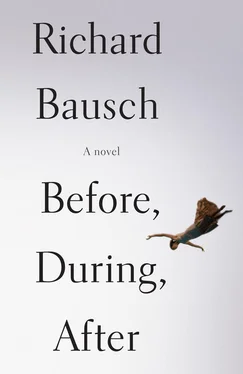“We’re all right,” he kept saying. “We’re okay. It’s okay.”
They got into the car. “I want to spend the night with you,” she told him, flying in the face of the anxiety that she had beaten back. “In your apartment. Tonight. I don’t want to visit with Iris for very long.”
“I think she’s planned to make dinner for us.”
“Can’t we get out of it?”
“Babe — she’s been as worried about you as I have.”
“I wasn’t the one in danger,” she said with an edge of impatience. “I just want to get started with things. Get past all this and be together and not have to think about it or talk about it.”
The fretful rush of her speech troubled him. Something else was in her downcast eyes. “Iris already suggested that we spend some time alone. Hey, sweetie, we’re okay .”
“I’ve missed you so terribly, Michael. I want you.”
He decided to go past any more talk about what they had separately been through. “I think I found us a house to rent.”
“Oh, that’s wonderful. Take me to it.”
“It’s just two blocks from Iris’s.”
“I love it. Take me there.”
He started the car and drove out of the lot and on, down Airways Boulevard. She gazed out at the trees, still as pictures in the windless heat. As he pulled onto 240 and headed east, she caught herself trying to imagine how it would look to her in a year. The road was full of speeding traffic. Everyone seemed to be in a careless hurry to arrive somewhere. At Getwell, he pulled off and went north to Walnut Grove. He turned left there, and above the distant horizon a big thunderhead was moving across the sun. Light poured out of the complex folds of the cloud in lovely lines, and the pelagic blue spaces beyond were bordered with tender fingers of gold. As the beauty of the scene struck through her, she received the unbidden thought that she would have no more free enjoyment of sights like this, and in the next instant the dread of the darkness she felt, the fear of losing forever her very ability to love, and the pure terror of what she had been through, combined in her to form a single, breathless spasm of sickening agitation.
When they pulled onto Mimosa, he said, “It’s the fourth one on the right.”
She looked at the house fronts, the lawns. Each of the entrances had an iron screened door. She had known them all her life, and now they made her think of jails. He saw her pale hand fly up to her face and then drop into her lap.
He parked in front, and for a moment they sat there looking at it. “Here we are,” he said.
The house was the color of coffee with cream. The light changed on it as the lowering sun came through another opening in the clouds, and she saw the small square windows across the top of the front door. “I used to walk by here,” she said, low. “Going for walks in good weather.”
“Does it feel strange to think you’ll be living here?”
“I guess it does. I never even really looked at it. It’s nice.”
A thin sidewalk led up to the front stoop. She got out and stood waiting while he came around the car and took her hand.
“I always thought it was a pretty neighborhood,” she said.
In the front yard, to the right of the walkway, a small tulip poplar stood. Crepe myrtles lined the street, making oblong ponds of shade on the grass going up to the crossing road. There was a tall, leaning river oak behind the house. It looked as though it had been arrested in the process of falling.
They went up the walk to the stoop, climbed the seven steps, and he opened the iron-framed screen door and put the key in the lock. It didn’t want to turn. Remembering Mr. Rainey’s trouble with the wrong keys in the lockbox, he wondered if somehow he’d got the bad set. He felt the need for things to go smoothly, pressing a little, aware of her standing there watching him. Finally he got the key to work and, pushing the door open, stepped back for her to enter. She went slowly, as if in wonder or disbelief, looking around. Her manner was that of someone still in a far place, alone. “We’ll paint this room, of course,” he said about the living room, which was a deep brown, with a large picture window at the back, looking into the yard. “Something bright. The real-estate agent said we could treat it like we own it where that’s concerned.”
“I like the window,” she said.
Their voices echoed slightly. She couldn’t shake her unease, moving through the rooms, the tight spaces inside the walls of the house. He was obviously proud of his choice, though now he murmured, as though the two of them were in church, that she did not have to like it at all; they could look for something else. It was quite small. She walked out the back door, to the patchy green yard with its shed and koi pond. Beyond the pond was a separated area, like a dog run, but whoever had lived here before had not used it for that purpose; it showed signs of a garden gone to seed. To the right of this was a rose arbor in the shape of a domed gazebo, with a wooden swing in the middle of it. The rosebushes were all overgrown, and some of the longer branches lay across the entrance. The petals were scattered everywhere on the ground.
“Needs work back here, too,” he said. “I can do some things. I should’ve looked closer at everything, I guess.”
She broke forth suddenly with a sob. “I shouldn’t have gone to Jamaica!”
It startled him. “Hey — we’re fine, honey. We don’t have to take this.”
So much stood in her mind: what she was going to have to do, the distance she would have to travel, and — she could not shake the feeling — everything for which she would have to atone. It seemed wholly out of her reach, past her strength.
Standing there, hearing the rasping breath of her distress, he was filled with a queasy kind of wonder. He stood back. “Baby,” he said, low. “It’s all right now. We’re all right now. Come on. We can look for somewhere else.”
“I should’ve come here with you,” she said through her tears. “I should’ve been here. I should’ve been here.”
“It’s okay if you want something else,” he said. “We don’t have to take this one.”
“No.” She turned to him. “No, I want it. I do. I want us in it. We could be moving into it by now.” Wiping her eyes with the backs of her hands, she started toward the rose arbor, feeling his proximity as oppression: if she could just walk out into the open space of the yard, where there was still a pocket of sunlight, to breathe a little and get command of herself. By herself.
“I’m okay with whatever you want to do,” he said, following her. “Really, honey.”
“I know. I love it. I wish we lived in it right now.”
“We’ll fix it up together.”
“Yes.”
“There’s a lot we can do.” He longed to take her arm and pull her back to him, but, sensing that it wouldn’t be what she needed or wanted, he refrained. There was something inaccessible about her now. “The two of us,” he went on helplessly. “It’ll be fun.”
She was still sniffling, still shying away from him.
“We can be like a couple of graduate students. Like we talked about.” It was as if he were pleading with her. “Remember? Going to antiques stores and shopping together for our house in Memphis. Here it is, if you want it. Our house in Memphis.” Now he felt garrulous.
“Yes, our house in Memphis,” she said.
They said nothing for a space, walking to one side of the house, and then around to the other, trying the gate there and looking briefly out at the street. Without expressing it to himself, he determined that the distance between them could for some obscure reason be a thing she required in order to come fully to him. He reassured himself with this notion, watching her walk back out past the river oak and then on to the center of the yard. Undeniably, something else was weighing on her mind. He decided it was the house and the fact that he had chosen it without her.
Читать дальше












